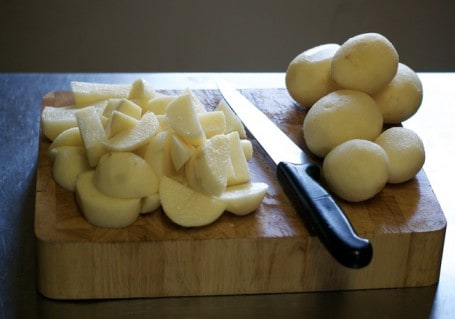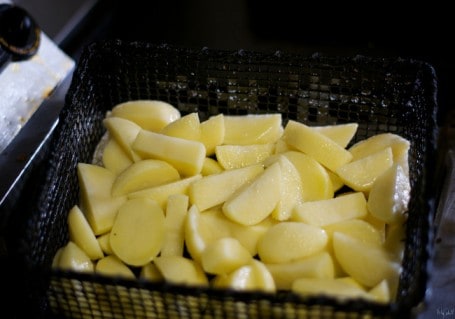My Dad makes the best chips in the world. He and the chip pan have been great friends for many years. Like any Irish Ulsterman he loves potatoes and could eat them for breakfast, lunch and dinner. When I was growing up we ate potatoes nearly every day: baked, roasted, pureed, sauté, mashed, champed, in colcannon, and chipped.
But chipped were our favourites. Hot chips straight out of the fat, tossed in salt, sprinkled with vinegar and served on a plate, or sometimes between a crusty white Belfast Bap, for a chip buttie. Oh, how my little brother and I loved chip butties. When I was seven a chip butty was heaven. Today it is a carb disaster.
Not for us the bags of frozen fries or chips. My father would have had a hernia if such a bag appeared in our house. Rubbish he called them, saying it a few times to reinforce his point: frozen chips, they’re rubbish.
We usually had Dad’s chips on a Thursday, the day the fish man came. His chips were made from scratch. A bag of earth covered potatoes would have been scrubbed and peeled, then cut by hand into chunky chips, dried in a clean tea-towel, then blanched and eventually fried, often in a chip pan or a saucepan full of boiling oil on the stove. This was back in the days before these became known as a fire hazard.
I have eaten in restaurants worldwide, and have never eaten chips as good as my Dad’s. They are little bites of heaven: big, fat hand-cut chips, with a dry crisp outside, and a fluffy, soft centre – just like a great roast potato would taste in flavour and texture.
When Dad first opened his restaurant, he taught every chef that worked for him how to make good chips. It never crossed his mind that he would serve frozen chips or fries, sometimes to the horror of the chefs, when they realised how time consuming making chips from scratch is. In high season we could have gone through several sacks of potatoes a week, that all had to be peeled and chipped before cooking..
Dad’s chips became the talk of the countryside. They are the stuff of legend in our part of Ireland – everyone who eats one wants to know how he made them, what his secret is. ‘I’ve never tasted chips like them!’ is the common response of his customers. Dad and I aren’t sure if there is a secret so to speak, but more a food philosophy of not cutting corners and preparing all food from scratch.
“Maris Piper potatoes are the best and a good clean oil – I use Wesson Green, a non-hydrogenated cooking oil – dirty oil ruins your chips before you begin frying, so all your hard work of scrubbing and cutting is lost,” he says.
The Maris Piper variety is, without doubt, the best for both roasting and frying. It’s a floury, dry potato, that when cooked properly crisps on the outside, and remains fluffy and light inside. Surprisingly for an Irish Ulsterman, Dad says that the best Maris Piper’s come from the potato fields of England.
The chips are blanched for fifteen minutes, ensuring the soft fluffy centre. Then, when the chips are fried at a higher heat, the outside cooks quickly, and doesn’t burn. If you tried to cook chips without blanching them, you would end up with little rocks – crispy skinned, with a centre of stone.
I remember as a teenager after a long night of working in his restaurant, guitars would come out, Irish ballads would be sung and Dad would bring out baskets full of piping hot chips, sprinkled with salt and doused with vinegar. They were devoured within moments, and often seconds were called for. This is one of my fondest memories.
My father’s top ten tips for perfect chips
1. Buy good quality, dirty Maris Piper potatoes, as fresh from the field as possible, making sure you aren’t buying spuds that have been counted in top soil to look dirty. You want potatoes that need a good scrubbing.
2. Scrub and peel the potatoes, putting each one into a bowl of cold water until you have as many as you need.Taking one potato at a time, dry it, and place it on a wooden cutting board.

3. Using a very sharp knife hand cut the chips into wedges, about an inch wide, making them roughly the same size, as they will cook better. You aren’t looking for uniformity in the shape of your chips, you don’t need perfect rectangles.

4. Put the chipped potatoes into a metal baking tray. Once all your potatoes are chipped, roughly dry them in the tray with a tea towel.
5. Heat the oil in a deep fat fryer to approximately 80-90 degrees Centigrade.
6. Blanch the chips at a temperature of approximately 80-90 degrres C. in the deep fat fryer for 10-15 minutes.
7. Test the chips after 10 minutes, being careful not to burn yourself with the hot oil. The chip should be soft in the middle when you squeeze it very carefully with your fingers.
8. When the chips are ready, shake off the excess oil, and put back into the dry metal baking tray.
9. Heat the oil to approximately 200 degrees C. and deep fat fry your blanched chips for 3-4 minutes until they are golden brown, and float in the top of the oil – remove from the oil
10. Give the chips a good shake in the chip basket, then toss them with salt, and serve.

